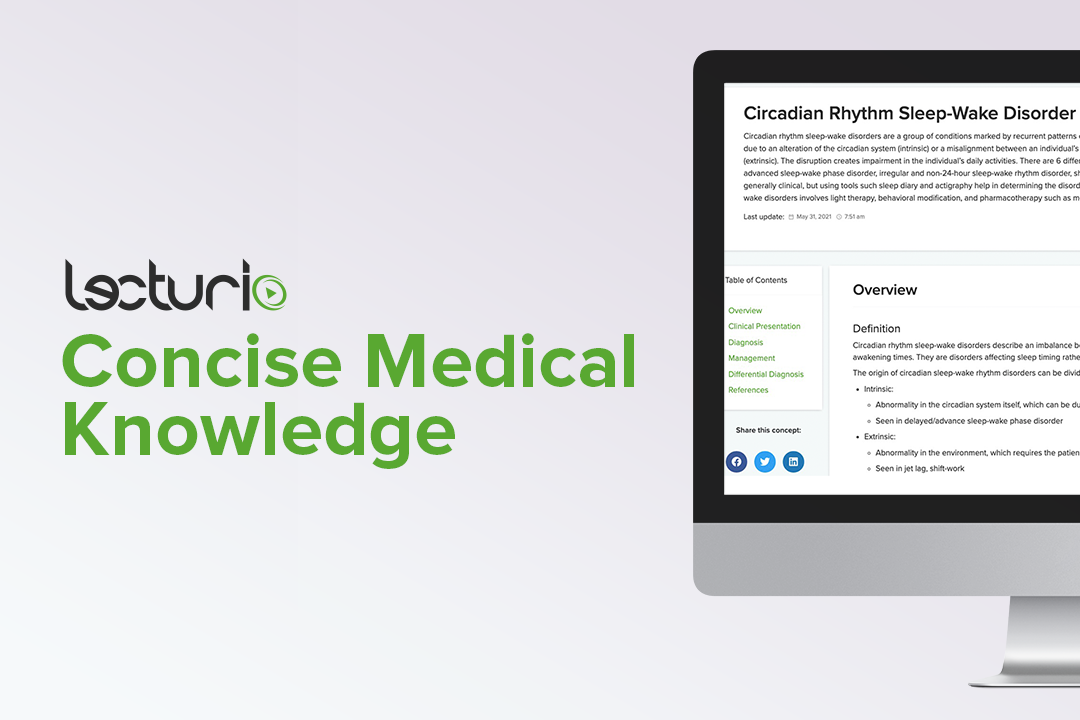Playlist
Show Playlist
Hide Playlist
Circadian Rhythm Sleep-wake Disorders and Delayed Sleep-wake Phase Disorder
-
Slides Sleep Disorders Circadian Rhythm.pdf
-
Download Lecture Overview
00:01 So when we think about circadian rhythm shift disorders, it's important to understand the intrinsic circadian system. 00:08 This is an endogenous biologically active, 24-hour cycle system that controls sleep. 00:14 It keeps us on a regular cycle. It's primarily regulated by the suprachiasmatic nucleus of the hypothalamus. And here, we see that visual input when the eyes open or when light hits the eyes, travels down the optic nerve, and there is one signal that goes right up directly to the suprachiasmatic nucleus of the hypothalamus. The suprachiasmatic nucleus projects to the thalamus and then subsequently to the brainstem to get us awake. And this is how light promotes wakefulness when we arise in the morning. The intrinsic circadian system is influenced by a number of things and helps to control sleep; both the depth, quality, and waking time of sleep episodes. It helps us to maintain wakefulness during the day and modulates many other systems through hypothalamic and thalamic projections. It regulates core body temperature, cortisol secretion, and appetite. So what are circadian rhythm sleep-wake disorders? Well, this is a group of conditions marked by recurrent patterns of sleep disruption. The circadian rhythm is off in some way. What causes circadian rhythm sleep-wake disorders? There are both intrinsic and extrinsic causes. Intrinsic causes include alteration of the circadian system in some way and extrinsic causes are from misalignment between the individual's inner circadian rhythm and the environment. So let's walk through some of the types of circadian rhythm disorders. We'll begin with delayed sleep-wake phase disorder. Here, we're looking at the sleep pattern of the patient over an average week. The patient would typically get in bed around 10 or 11 pm and we see in this disorder a delayed onset of sleep. The patient is unable to get to sleep until 4 am. In addition, we see that the awakening time is also delayed with an awakening time of around noon and importantly the sleep quality and duration is preserved in sleep-wake phase disorder. So basically, sleep is still happening and of sufficient quality but it's much later in the night. Risk factors for sleep-wake phase disorder are puberty, we see changes in the circadian rhythm and melatonin secretion. Caffeine and nicotine use can cause this. Irregular sleep schedules can contribute to this. Depression can contribute to this condition as well as ADHD. 02:48 And typically patients present with difficulty with jobs that start in the morning. 02:53 Sleep is normal when the patient is able to arrange sleep around their schedule and you can think of this as the night owls. These are people who like to go to bed later and wake up later and that can interrupt normal, social, and job interactions.
About the Lecture
The lecture Circadian Rhythm Sleep-wake Disorders and Delayed Sleep-wake Phase Disorder by Roy Strowd, MD is from the course Sleep Disorders.
Included Quiz Questions
What class of disorders describes a group of conditions characterized by recurrent sleep disruption patterns?
- Circadian rhythm sleep–wake disorders
- REM sleep behavior disorders
- Night terrors
- Nightmares
- Recurrent cyclic insomnia
What is a risk factor for delayed sleep–wake phase disorder?
- Caffeine and nicotine use
- Regular sleep schedule
- Generalized anxiety disorder
- Older age
- Sedative use
A patient presents to your clinic. For many years, he has had difficulty waking up early. However, on weekends, when he can sleep later, he often goes to bed around 3 AM and wakes up around 11 AM feeling refreshed. He describes himself as a “night owl.” What circadian rhythm sleep–wake disorder do you suspect this patient has?
- Delayed sleep–wake phase disorder
- Advanced sleep–wake phase disorder
- Irregular sleep–wake rhythm disorder
- Shift work disorder
- Jet lag disorder
Customer reviews
5,0 of 5 stars
| 5 Stars |
|
5 |
| 4 Stars |
|
0 |
| 3 Stars |
|
0 |
| 2 Stars |
|
0 |
| 1 Star |
|
0 |




